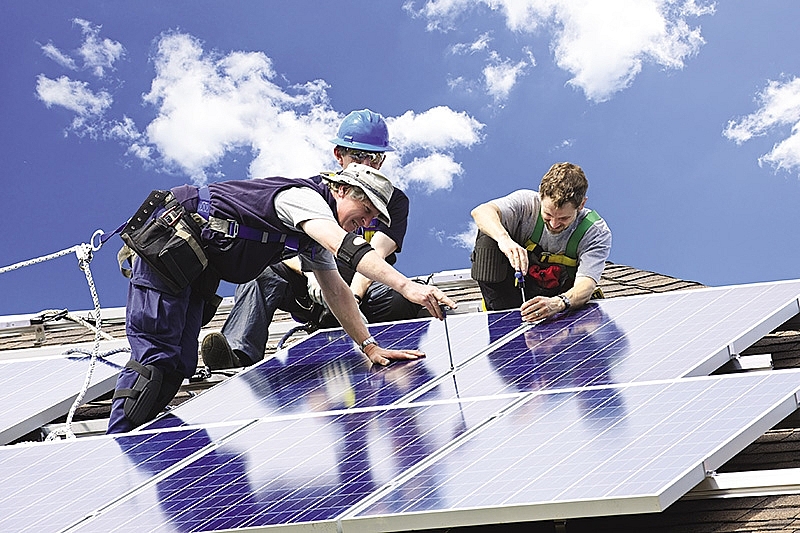Race hots up over solar panel manufacturers
 |
| As the global demand increases, Vietnam is competing to become an ideal investment destination for the solar segment, Photo: shutterstock |
Last week, the United States’ TTI Group showed its interest in building a $150 million solar photovoltaics (PV) factory in Saigon Hi-Tech Park in Ho Chi Minh City. This would become the group’s second investment in a PV solar factory. This increased investment comes amid higher global demands as well as companies wanting to lower costs and to void anti-dumping issues.
According to the European Commission’s 2017 PV Status Report, the compound annual growth rate over the past decade was over 40 per cent, making photovoltaics one of the fastest growing industries. Solar PV systems are today recognised as a promising form of renewable energy technology. The overall market for PV solar is expected to continue to grow globally while the cost of installing and making solar panels continues to drop.
This growth has led First Solar, one of the US’ largest solar equipment manufacturers, to return to Vietnam five years after the company cut ties to the nation and after being unable to find a suitable investor to take its place.
“We have seen an increase in the demand for the product globally, so we have reactivated our investment in Vietnam. The reasons why we came back to Vietnam are the favourable business conditions, the skilled workforce, the valuable supply chains, the stable political system, competitive costs, and the growing needs of the high-tech industry within the region,” said Mike Koralewski, senior vice president in global module manufacturing of First Solar.
“First Solar has moved forward its manufacturing plans for the initial factory, and recently committed to a second factory here in Dong Nam Industrial Park in Ho Chi Minh City. We have strong customer demands for our new Series 6 product and our investment in Vietnam is a critical component to our future success,” he added.
With preliminary module production set to start during the fourth quarter, the two factories will produce 2.4 gigawatts (GW) worth of First Solar’s Series 6 modules annually when they first become fully operational. Domestically, in addition to producing modules, the company is actively exploring module supply agreements to support local projects, and is looking forward to supporting the growth of the solar industry nationwide.
This is part of the manufacturer’s aggressive plans to expand its manufacturing capacity. The company is expected to increase its total production capacity from roughly 2GW in 2017 to about 7.6GW by 2020.
With big players from the US and China already basing their facilities here, competition for services is set to increase.
The northern province of Bac Giang is currently hosting eight projects belonging to Chinese and Taiwanese investors, which will form the largest solar energy equipment manufacturing chain in the country, with a total capacity of 5,200 megawatts (MW) per year.
The US Department of Commerce has imposed new tariff duties of up to 165.04 per cent on crystalline silicon PV solar imports from China and Taiwan, after it found panels were being sold too cheaply in the US market.
China is the world’s largest producer of PV equipment, and some well-known Chinese manufacturers, including Trina Solar, JA Solar, and Bowerway Group, have spent several years dodging trade barriers by shifting production to Vietnam. These companies are now scrambling to find new customers, both domestic and foreign, in a sharp reversal of fortunes for them.
Trina Solar last week announced that it will deliver Passivated Emitter and Rear Cell modules to a new 258MW project located in the central province of Ninh Thuan. The project, with capital investment of around $220 million from Vietnam’s Trung Nam Group, is set to become the country’s largest solar power project when it is completed next June.
Trina Solar, who own a 1GW solar cell manufacturing facility in Vietnam, revealed, “With the huge demand for PV products, the facility is the first combined wind and solar power generation plant in Vietnam and is expected to play a key role in the country’s transformation to renewable energy.”
Meanwhile, China’s JA Solar is constructing a $280 million solar cell manufacturing plant in Bac Giang.
“While we anticipate more market headwind in the near term, we are confident that our favourable geographic exposure, prudent cost control, and flexible business model will enable us to succeed,” noted JA Solar’s report.
What the stars mean:
★ Poor ★ ★ Promising ★★★ Good ★★★★ Very good ★★★★★ Exceptional
Related Contents
Latest News
More News
- Bac Ai Pumped Storage Hydropower Plant to enter peak construction phase (January 27, 2026 | 08:00)
- ASEAN could scale up sustainable aviation fuel by 2050 (January 24, 2026 | 10:19)
- 64,000 hectares of sea allocated for offshore wind surveys (January 22, 2026 | 20:23)
- EVN secures financing for Quang Trach II LNG power plant (January 17, 2026 | 15:55)
- PC1 teams up with DENZAI on regional wind projects (January 16, 2026 | 21:18)
- Innovation and ESG practices drive green transition in the digital era (January 16, 2026 | 16:51)
- Bac Ai hydropower works stay on track despite holiday period (January 16, 2026 | 16:19)
- Fugro extends MoU with PTSC G&S to support offshore wind growth (January 14, 2026 | 15:59)
- Pacifico Energy starts commercial operations at Sunpro Wind Farm in Mekong Delta (January 12, 2026 | 14:01)
- Honda launches electric two-wheeler, expands charging infrastructure (January 12, 2026 | 14:00)

 Tag:
Tag:




















 Mobile Version
Mobile Version